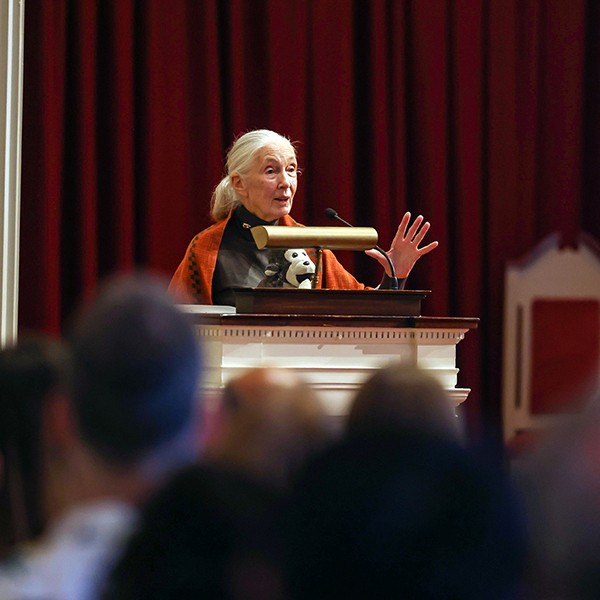Dr. Jane Goodall Inspires UMD Audience
A famed scientist who broadened humanity’s understanding of itself through groundbreaking studies of some of our closest animal relatives told a campus audience on Wednesday, Oct. 12, 2022 that amid the darkness arising from brutal wars and threats from climate change, there are valid reasons to hope—and to choose action over despair.
“We get to choose what kind of impact we make”—from removing litter to planting trees to eating plant-based diets, British ethologist and author Jane Goodall told a capacity crowd at the University of Maryland’s Memorial Chapel. “We can all choose what we care about.”
Studying chimpanzees in Tanzania while in her 20s, Goodall observed them removing termites from a termite mound with a stick to eat—the first documented evidence that animals other than humans could make and use tools. The profound finding spurred her mentor, famed paleoanthropologist Louis Leakey, to declare, “Now we must redefine tool, redefine man, or accept chimpanzees as human.”
Her in-depth studies of chimpanzees’ individual “personalities” and their societal bonds further expanded our knowledge of primates, and Goodall has spent the majority of her 88 years as a popular spokeswoman for science through her books, the pages of National Geographic and television programs like “Wild Kingdom.”
In her UMD lecture, co-sponsored by the College of Behavioral and Social Sciences and the College of Computer, Mathematical, and Natural Sciences, the United Nations Messenger of Peace narrated her journey from an animal-loving girl who once filled her bed with earthworms to an early-career scientist to a budding activist. The National Institutes of Health’s decision last year to end its chimp experiments and send test subjects to sanctuaries was the culmination of her nearly 40-year fight.
Excerpt of story by Chris Carroll appears courtesy of Maryland Today. Photo by Stephanie S. Cordle/University of Maryland.
Published on Thu, 10/13/2022 - 13:23


